Local SEO - How to Conquer Search in Your Locality
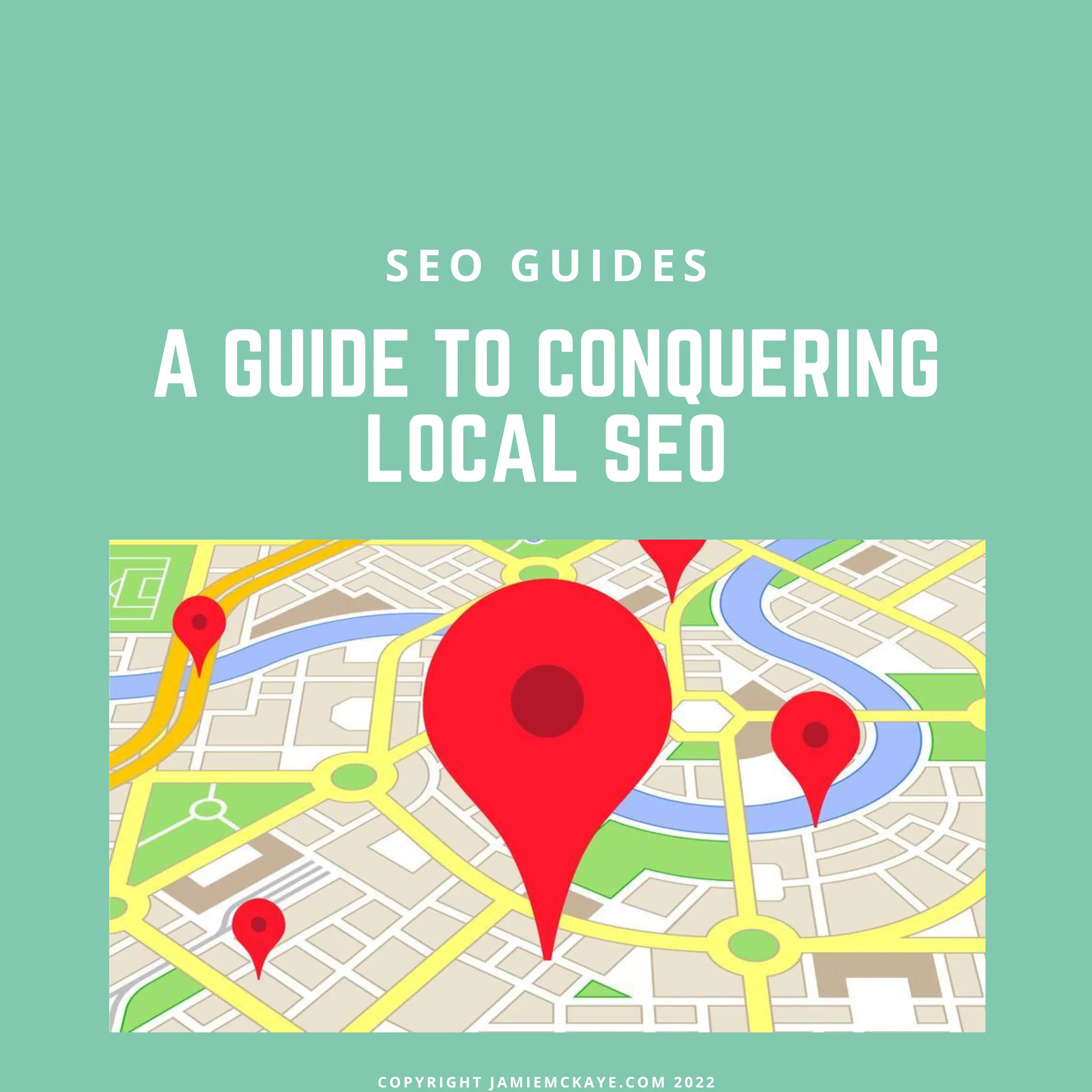
Local SEO, is it really as important as some would have you believe?
The answer is a resounding yes; almost half of all Google searches are local.
So, if you’re a business which is yet to get its local SEO up to scratch, then you risk missing out big time, because people are searching and a lot of them are searching locally.
Thanks to the smartphones in our pockets, as many as 89% of us cast our nets seeking local businesses at least once every week, 58% do it daily and almost three quarters of those will visit a local store or business as a result.
Neglect your local SEO at your peril, because if the competition is smart, they certainly won’t be neglecting theirs.
Pssst, want help driving your local SEO to new heights? Email me at jamie@jamiemckaye.com for a custom quote.
Table of Contents
- What exactly is Local SEO?
- Local SEO: Optimising your Website
- Creating a dedicated contact page on your site
- Putting your local business on the map
- Adding Testimonials
- Adding Schema
- Claiming your Google My Business
- Improving Local SEO by claiming other profiles
- Creating content aimed locally
- Knowing who you’re writing for
- Encouraging customer reviews for a Local SEO boost
- Citation Link Building
- Local SEO, in conclusion
What exactly is Local SEO?
It does what it says on the tin, it’s the art of increasing your visibility to those in your local area. Think organic SEO with geographical elements added in for good measure. The goal of course, is to rank highly for local searches.
For example: It would be pointless for a Mexican restaurant in Liverpool to rank highly in a local search for Mexican restaurants in Land’s End, right?
Their business may well depend on the strength of their local SEO in Liverpool, to increase their local organic traffic and get diners on seats.
So where might they start? According to Moz’s very useful SEO report, leveraging the power of Google Business Signals (including keywords and proximity) is a potent way to begin and elevate the local business into Google’s hallowed three-pack.
The three-pack is the collection of the three top results for any given local business search, it used to be a 7-pack, however mobile searches needed a more convenient screen fit, hence seven was truncated to three
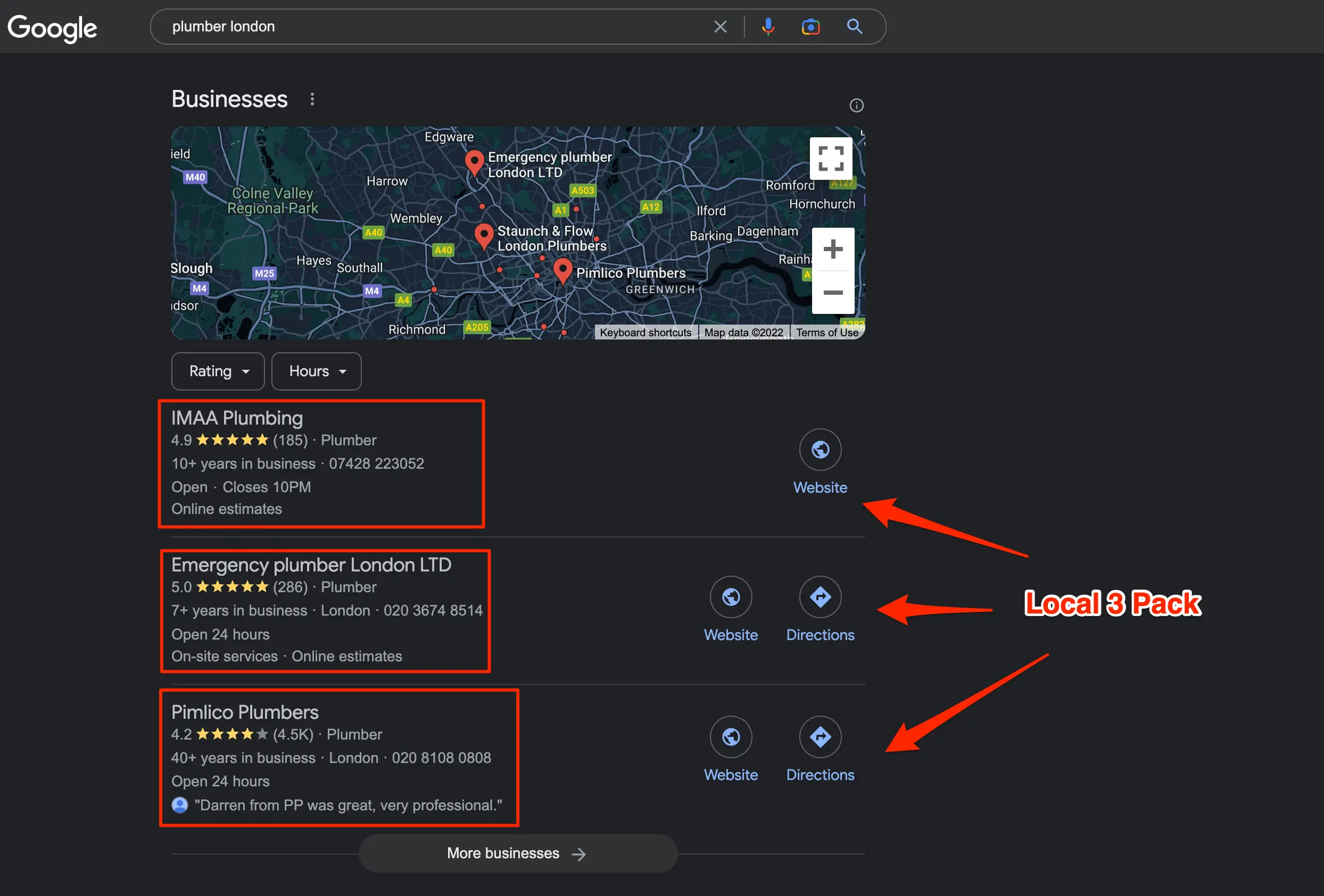
In a world of perfect local SEO, this is where your business should aim to sit. How do you do that?
Try these steps for size to improve your local SEO:
- Ensure you have a contact page
- Make any contact numbers clickable on mobile devices
- Add a map and location to your site and use schema
- Claim that Google My Business Profile and optimise the heck out of it
- Make customer reviews a priority
- Create lists of local events and other locally targeted content
Don’t worry; we’ll take a closer look at each below.
Local SEO: Optimising your Website
Climbing the SERPS will be a much tougher challenge without effective SEO optimisation, in addition to standard SEO best practices, here’s the lowdown on local SEO:
Creating a dedicated contact page on your site
Yes, these days people like to know a few more details about their local businesses. Name, Address (or addresses) and Phone numbers (must be clickable for convenience) are important; while you’re at it, share your email too.
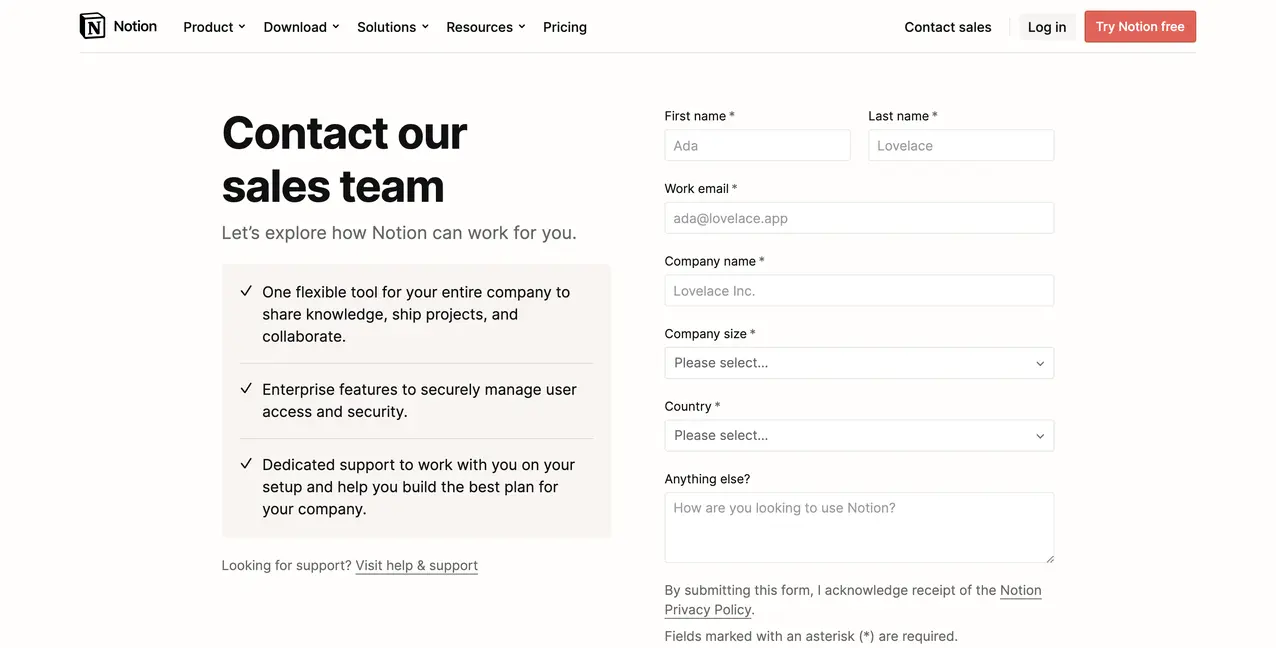
Clickable links are an important part of optimisation for mobile, as anyone who has ever tried to juggle between apps to enter a mobile will know, it’s a big deal.
Putting your local business on the map
After all, the whole point of Local SEO is making it easy for those nearby to find you!
86 Percent of us like to look up a business location on Google Maps, making it important to have a presence which makes it even easier for people to find you.
You can get started here
Adding Testimonials
These are a trust signal, plain and simple. They earn trust and help to demonstrate that the products and services you provide are real. Local SEO guide has an entire page dedicated to these types of review.
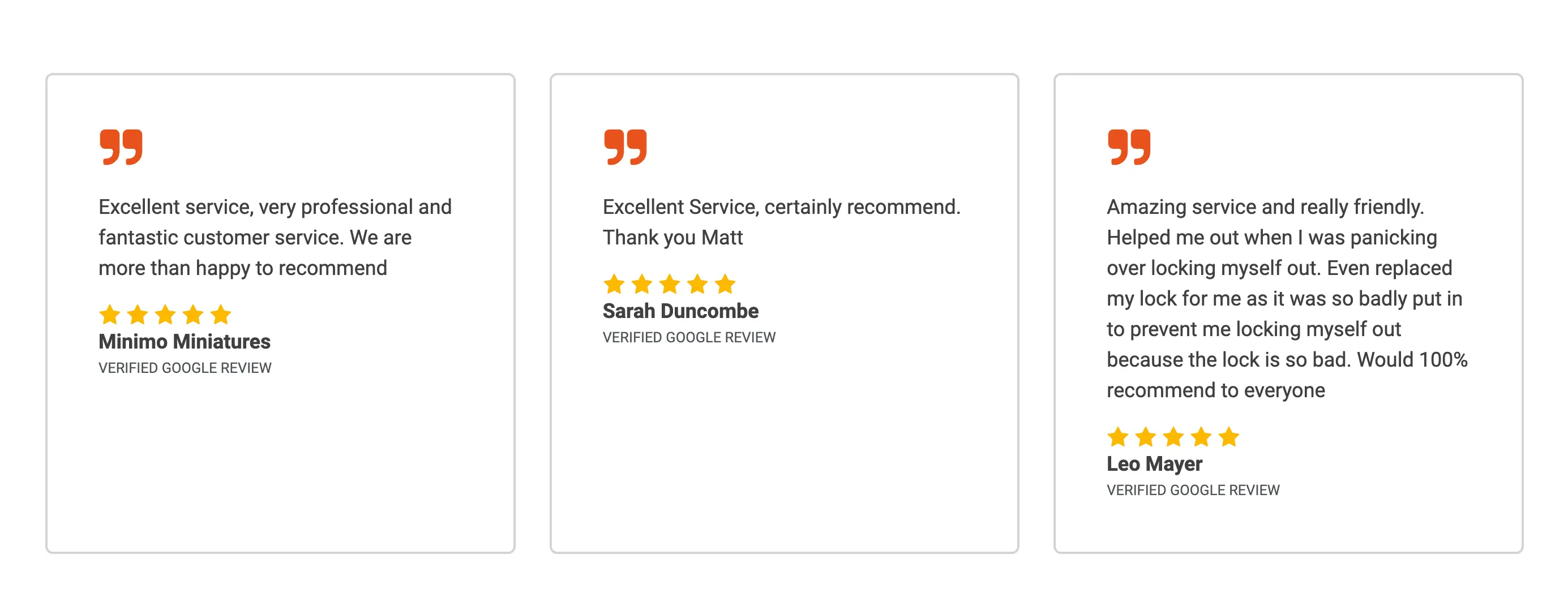
Adding Schema
Sites such as Schema.org were created with the intention of creating a common language between the big Search Engines, making the process if understanding what they are about easier.

By adding the right schema mark-up to your site, you are making it clear that your business is local, not a big brand. This is a very smart move for local ranking, that’s why Hall Analysis has created a tool helping you to create your very own schema mark-up.
Claiming your Google My Business
And any other relevant online profiles!
- Because your website alone is not enough... Ensure your business has correct and up to date listings for other sites such as Yelp, Trip advisor, Facebook and any other well known local review sites in your area.
The reason why, is that Google’s hallowed three-pack of results if often followed by review sites such as these.
Taking the time to ensure your Google My Business profile is probably the best place to start however, allowing you to manage your presence within the search giant’s engine. Take the time to fill in your profile completely, encourage reviews and show a detailed profile of your business, there are serious rewards to be had here.
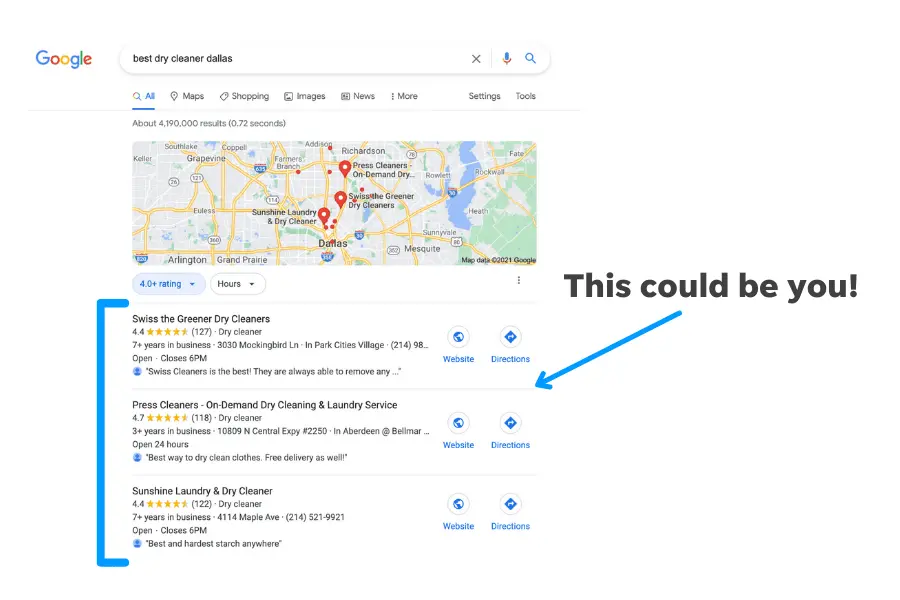
Every so often you’ll see the occasional local review site nestled among the other big players such as Trip advisor, Facebook and Yelp. Neglect them at your peril!
Improving Local SEO by claiming other profiles
Some of the social channels relevant to your target audience are important to set up as your own. When doing this, one rule is important above all others:
Make certain your information is identical across each platform!
Setting up these profiles, delivers consistency and visibility to potential clients, it also provides Google with even more information about your business or service.
And that will boost your rankings even further.
Creating content aimed locally
Blogging is vital for SEO in all its forms, if you can try to host your blog within your business’s domain to maximise the SEO benefits and gain links to your business’s main site as you acquire links to your blog content.
- Because links also a big deal when it comes to localised organic ranking factors, therefore as the rankings increase for your blog, so will the rankings for your site.
When creating that localised content, include town names, your city and local areas when you can. Not everyone uses their closest city however, making neighbourhoods, villages and even colloquial names equally worth bearing in mind.
Other content that is great for Local SEO might be:
- Community events, elections, fairs and local news
- Your sponsorship of local events or charity work
- Interviews with prominent local experts or figures
It might seem counterintuitive but when it comes to actually writing about your business, try and avoid it...
Instead write about topics that will help and benefit your local audience in some way, aim to become a source of trust.
Build your audience but seize opportunities to build inbound links too, a solid way to do that is to join conversations in local business groups and blogs. Don’t post just for the sake of it; instead offer insight with engaging comments and mentioning their posts in your planned future blogs.
Knowing who you’re writing for
Crafting valuable content that hits the mark relies heavily on knowing who you are writing for. Always avoid taking content from other sites, even if they are your manufacturers unless you’re using them as quotes in your original content or attributed sources.
Encouraging customer reviews for a Local SEO boost
In the days before the internet, even bad businesses could fool customers into thinking they were great ones.
Try doing that nowadays!
Power is firmly in the customer’s corner in the world of today, and the entire world can see how good you are (or aren’t.)
Research by Deloitte proves it, 81% of us check ratings and read reviews before deciding what’s right for them; more than a third of us comment on blogs and take part in online forum discussions.
A staggering 97% of us say customer reviews play some part in our buying decisions.
That’s almost everyone...

If your goal is to attract local customers, your reviews have to be as good as possible, anything other than four or five stars can mean serious problems.
Every business of course will receive a less than perfect review. Responding politely, professionally and personally is important.
The best way to avoid them is to go the extra mile in impressing your local clients with a first class product or service.
It is believed that Google reviews have the greatest impact when it comes to Google’s local rankings so you could (and definitely should) create and share a link to your review form to make it as easy as possible for clients to throw some positive reviews your way.
Google though, just like every review platform has terms of service and guidelines to follow, it is important to know them.
Google for example, will come down hard on anyone offering incentives in exchange for reviews; Yelp completely forbids attempts to even ask for them.
There is a fine balance between encouraging feedback and being pushy (examples might include things such as review stations or pop ups. Local customers should always leave reviews of their own accord, using their own devices and from accounts they have set up.
Encouraging reviews and making the process easy should be an ongoing thing, be wary of pushing for a wealth of sudden reviews, because Google certainly will be when they appear on your profile page and it may result in filtering on some platforms.
Citation Link Building
What are citations in the context of local SEO?
Simply put, citations are mentions of your site, your business name and contact details anywhere on the web; there doesn’t have to be a link involved to your site or anywhere else.
A citation is purely a mention, and they are important for Local SEO, making up around eleven percent of local pack-ranking factors.
You can build citations for one physical location you have or several, but ensure to avoid non-physical locations such as virtual offices and P.O box locations, they’re not acceptable.
Mismatched contact details account for a staggering 41% of total ranking issues, making it important to ensure Names, Addresses and Phone details (NAPS) are identical and correct for each and every location you build citations for.
Want to build citations for Local SEO?
Here’s how:
Local blogs: A top place to grab a business listing that will boost your local SEO, most are well-indexed and strongly associated with a particular region, town or city.
Local Search Engines: Search engines crawl the web for citations to perform good housekeeping on the information in their own indexes. You can help the process along by listing your business on sites such as Yelp.

Local-centric directories: Much like blogs, these have strong associations with a given geographical area. They are even better if maintained by a human, because they are less prone to spam and trusted more by Google & Bing.
Industry specific blogs & directories: These may not have a focus locally, local search engines may still count them as citation sources making it important not to overlook them. Membership directories are a great example of this, as well as trade organisations.
Local SEO, in conclusion
The scrap to climb SERPS is a tough one, especially for SMEs with limited resources, but it remains critical for your business success locally.
People rely more than ever these days, on reviews, maps and search engines to find the best local services and products.
The climb is not an easy one, but site optimisation, great local content, positive online reviews and acquiring citations combined will be enough to give many businesses the footholds they need to succeed.
If your business is bad, then your reviews will be too, so focus on building the best business you can and your online efforts will reflect it.
And as always, If you need help, get in touch


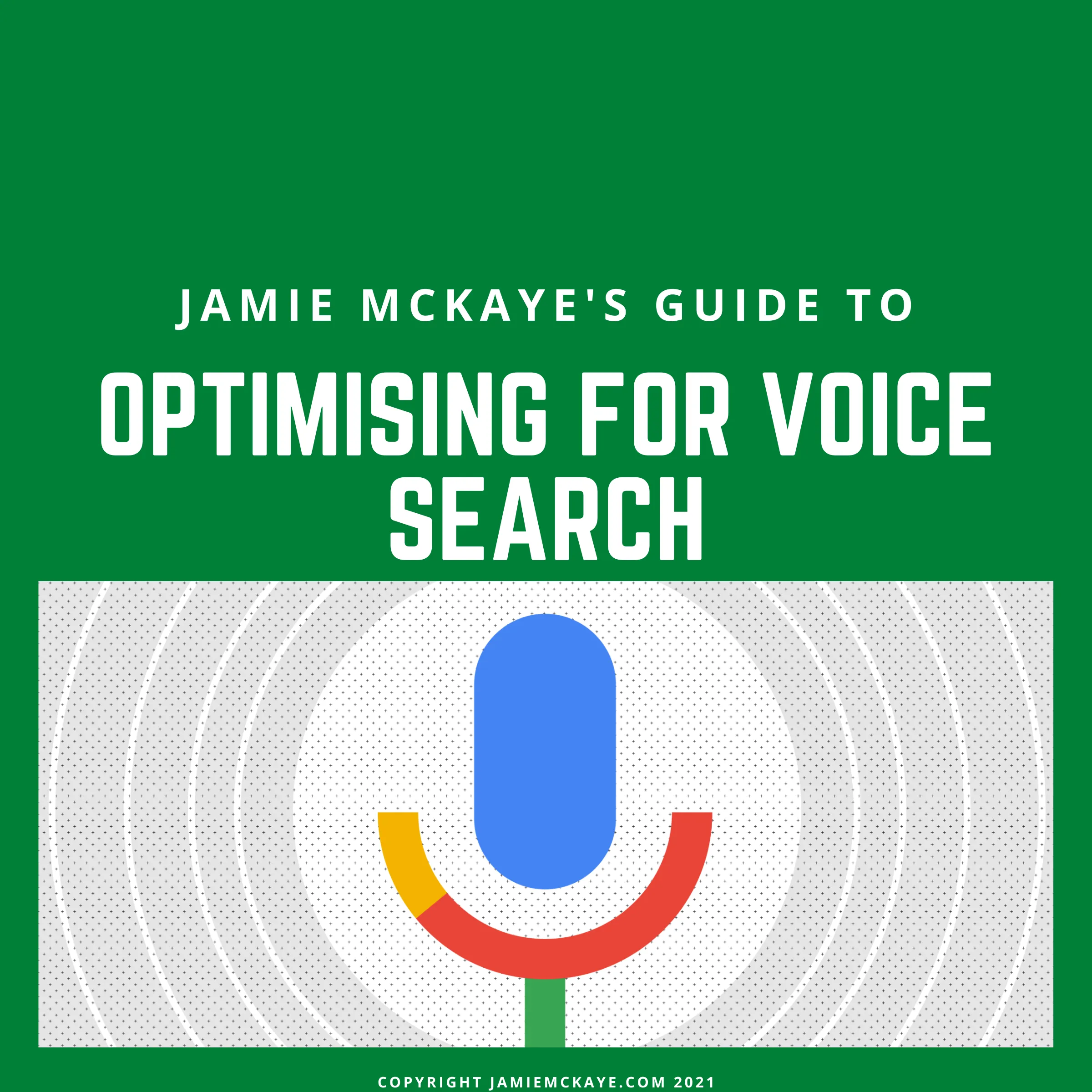
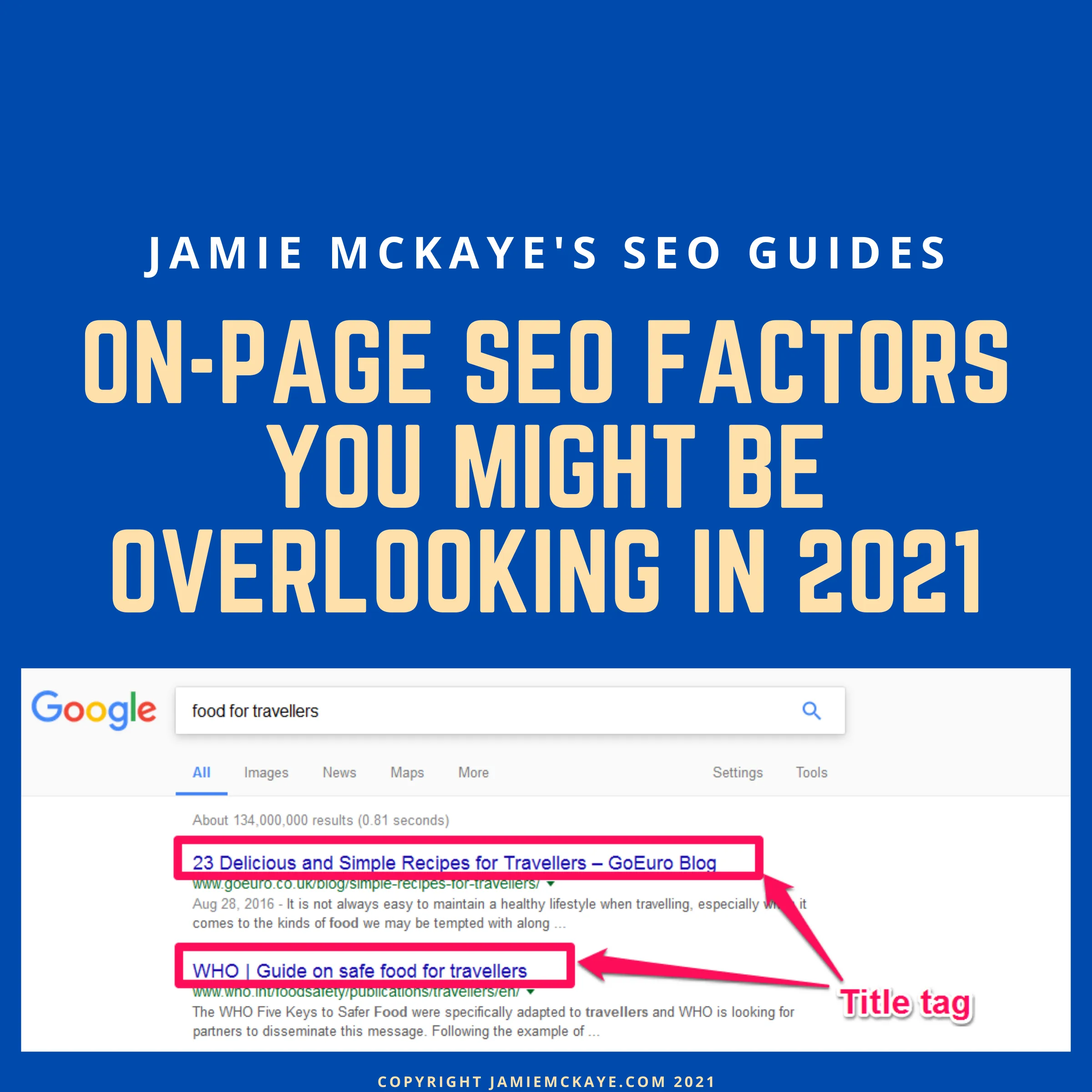
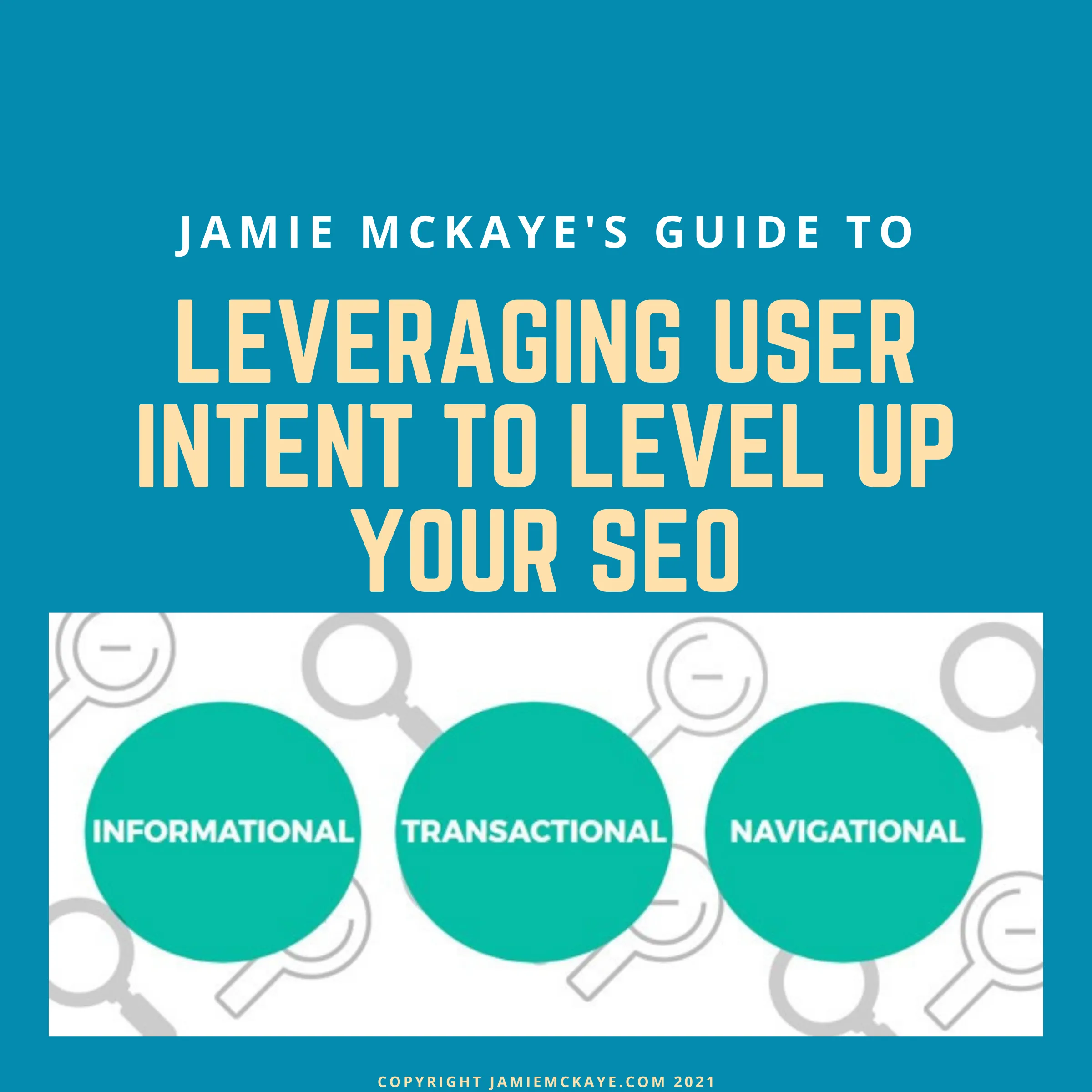
Comments